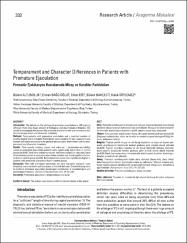Temperament and character in differences in patients with premature ejaculation
Citation
Altunoluk, B., Bagcioglu, Erman, Efe, E., Bahceci, B., Soylemez, H., (2013).Temperament and Character Differences in Patients with Premature Ejaculation.Noropsikiyatri Arsivi, 50(4), 332-336.https://doi.org/10.4274/Npa.y6443Abstract
Introduction: The debate on the etiology of premature ejaculation is still ongoing although there was huge amount of biological and psychological theories. We aimed to investigate the personality structure of patients with premature ejaculation via temperament and character inventory. Methods: Forty patients with premature ejaculation and a matched number of healthy people were included. Participants were asked to fill out a questionnaire booklet with separate sections for general demographic information and the temperament and character inventory. Results: Total novelty seeking scores and subscale 1 (exploration-excitability) scores in premature ejaculation patients were significantly higher than in control groups (p<0.05). Total harm avoidance scores and harm avoidance subscale 2 (fear of uncertainty) scores in premature ejaculation patients was found significantly lower than in control group (p<0.05). Beck depression score was significantly higher in patients with premature ejaculation than in control groups. Discussion: Men with premature ejaculation are more impulsive (excitant), more tempered, more excitable and less prone to harmful behavior. Current findings tend to reinforce premature ejaculation based upon combination of neurobiological and psychological reasons. © Archives of Neuropsychiatry, published by Galenos Publishing.


















